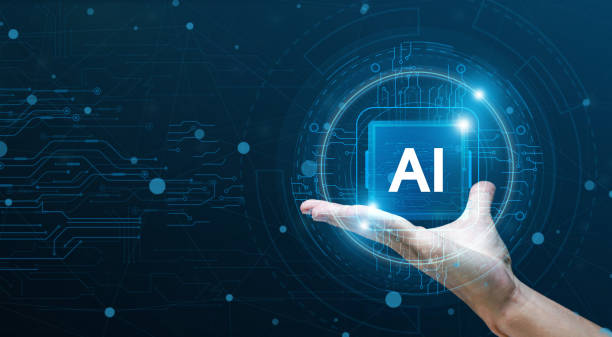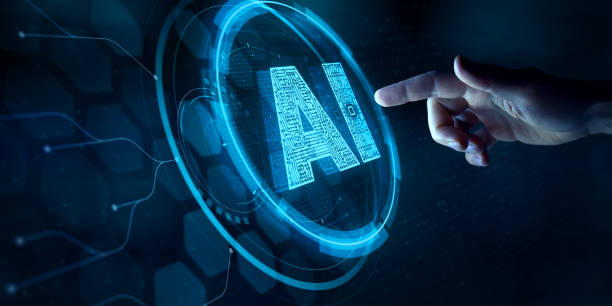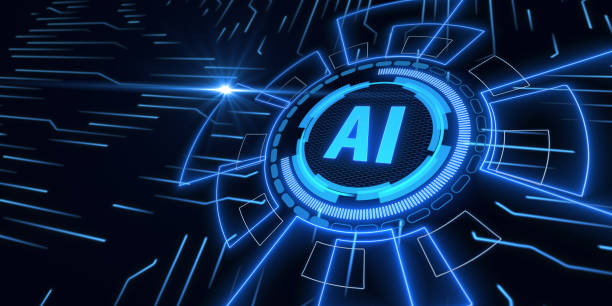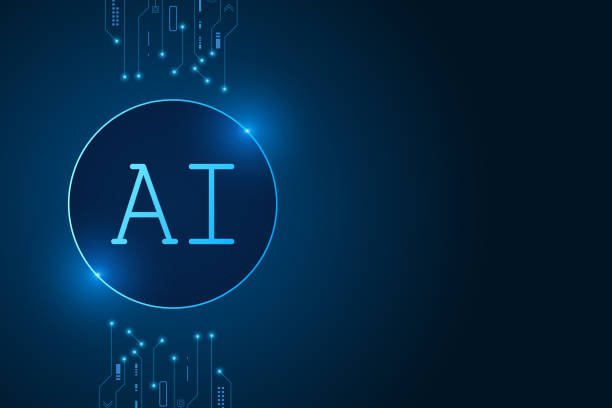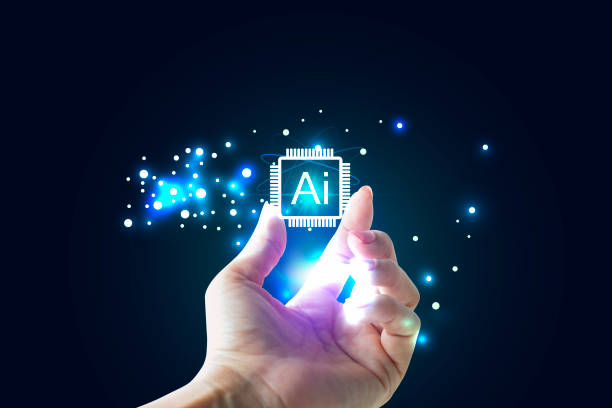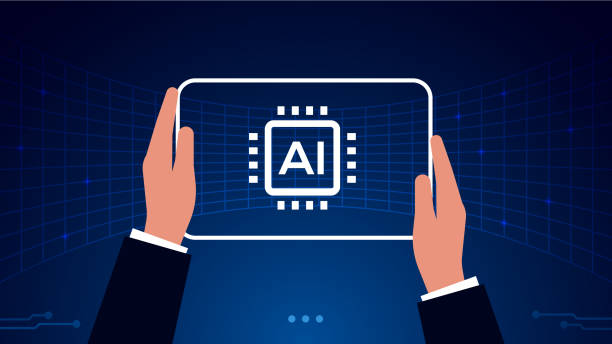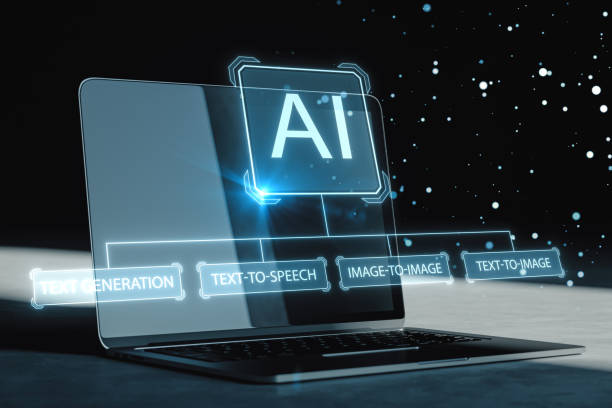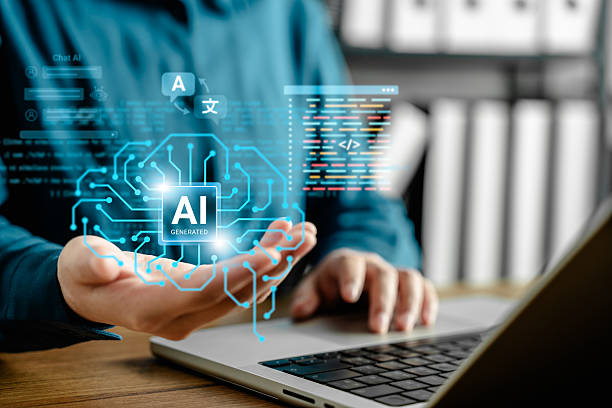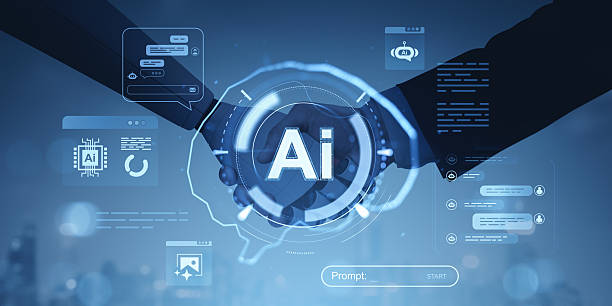What is Artificial Intelligence and How Does it Impact Jobs?
Artificial Intelligence (AI), in short, refers to the ability of a computer system to perform tasks that typically require human intelligence.
These tasks include learning, problem-solving, pattern recognition, decision-making, and understanding natural language.
#Artificial_Intelligence analyzes data and discovers patterns and relationships through various algorithms and models.
These abilities have made artificial intelligence a powerful tool for automation, improving efficiency, and creating innovation in various industries.
The impact of artificial intelligence on jobs is very broad and multifaceted.
On the one hand, artificial intelligence can automate many repetitive and routine tasks, leading to increased productivity and reduced costs.
On the other hand, this automation can lead to the replacement of some jobs, especially jobs that require fewer skills.
However, artificial intelligence also creates new job opportunities, especially in areas such as artificial intelligence development, data analysis, and management of intelligent systems.
In short, the future of artificial intelligence careers requires adaptation and learning new skills to take advantage of the opportunities created and reduce potential challenges.
Artificial intelligence job opportunities can be created and developed in various fields. For example, artificial intelligence is very practical in agriculture and has led to many advances.
Tired of your online store not generating as much revenue as it could? Rasaweb, specializing in professional online store design, solves this problem forever!
✅ Increased sales rates and revenue
✅ High loading speed and exceptional user experience
⚡ Get a free consultation on online store design
Examining Jobs at Risk and New Jobs in the Age of Artificial Intelligence
With the increasing advancement of artificial intelligence, some jobs are more at risk than others.
Jobs that rely on performing repetitive and routine tasks, such as telephone operators, data entry clerks, and some production workers, are more likely to be replaced by automation.
Also, jobs that do not require specific skills and can be easily assigned to algorithms are at greater risk.
The future of artificial intelligence careers for people who are employed in these jobs requires changing career paths and acquiring new skills.
In contrast, artificial intelligence also creates new job opportunities.
Jobs that require specialized skills in the field of artificial intelligence, data analysis, and software development are growing.
For example, artificial intelligence engineers, data scientists, business analysts, and cybersecurity specialists are among the jobs that will be in high demand in the coming years.
Also, jobs that require human skills such as creativity, critical thinking, and emotional intelligence are less at risk and may even improve with the help of artificial intelligence.
Machine learning engineers are another job that is in high demand.
In general, the future of artificial intelligence careers requires a focus on developing soft and hard skills that cannot be replaced by automation.
These skills include problem-solving, communication, leadership, and continuous learning.
Skills Needed to Succeed in Future Jobs with Artificial Intelligence
To succeed in the future of artificial intelligence careers, having certain skills is essential.
These skills can be divided into two general categories: technical (hard) skills and soft skills.
Technical Skills:
- Programming: Familiarity with programming languages such as Python, R, and Java is essential for developing and implementing artificial intelligence algorithms.
- Data Analysis: The ability to collect, analyze, and process data to extract useful information and meaningful patterns.
- Machine Learning: Understanding the concepts and algorithms of machine learning and the ability to use them to solve various problems.
- Statistics and Mathematics: Having a strong knowledge in the field of statistics and mathematics to understand artificial intelligence algorithms more deeply.
- Software Engineering: Ability to design, develop, and deploy intelligent software.
Soft Skills:
- Problem Solving: Ability to identify and solve complex problems using artificial intelligence.
- Critical Thinking: The ability to evaluate information and ideas and make logical decisions.
- Creativity: The ability to generate new and innovative ideas for using artificial intelligence.
- Communication: The ability to communicate effectively with colleagues, customers, and other stakeholders.
- Continuous Learning: The ability to learn new skills and adapt to rapid changes in the field of artificial intelligence.
In addition to these skills, having a positive and flexible attitude is also very important for success in the future of artificial intelligence careers.
| Skill | Description |
|---|---|
| Programming | Familiarity with programming languages such as Python, R, etc. |
| Data Analysis | Ability to extract information from large volumes of data. |
| Machine Learning | Understanding and implementing machine learning algorithms. |
| Statistics and Mathematics | Strong knowledge in the field of statistics and mathematical modeling. |
The Role of Education and Continuous Learning in Preparing for Future Jobs
Given the high rate of advancement in artificial intelligence, education and continuous learning play a vital role in preparing for the future of artificial intelligence careers.
Formal and informal education can help people acquire the skills needed to succeed in this field.
Click here to preview your posts with PRO themes ››
Online training courses, coding bootcamps, and university degrees in the fields of artificial intelligence, machine learning, and data science provide good opportunities to acquire basic knowledge and skills.
Also, attending conferences, seminars, and training workshops can help people stay informed about the latest developments in the field of artificial intelligence and connect with experts in the field.
In addition to formal education, continuous learning is also very important.
Reading scientific articles, participating in open-source projects, and practicing with new tools and technologies can help people keep their skills up-to-date and face new challenges.
The future of artificial intelligence careers is bright for those who are constantly learning and developing their skills.
Also, developing soft skills such as problem-solving, critical thinking, and communication is also very important.
These skills help people succeed in complex and dynamic work environments.
Worried about losing customers who don’t have a professional online store?
Forget these worries with Rasaweb’s online store design!
✅ Significant increase in sales and visitor-to-customer conversion rates
✅ Professional and user-friendly design that builds customer trust
⚡ Get a free consultation from Rasaweb
Impact of Artificial Intelligence on Various Industries (Healthcare, Finance, Manufacturing, etc.)
Artificial intelligence has had a significant impact on various industries and is creating fundamental changes in how things are done.
Healthcare: Artificial intelligence plays an important role in diagnosing diseases, developing new drugs, and improving patient care.
Machine learning algorithms can analyze medical images and diagnose diseases more accurately.
Also, artificial intelligence can help doctors make treatment decisions and provide personalized treatment plans.
The future of artificial intelligence careers in this sector is very bright.
Finance: Artificial intelligence is used in fraud detection, risk management, and providing personalized financial services.
Machine learning algorithms can identify suspicious patterns in financial transactions and prevent fraud.
Also, artificial intelligence can help investors make investment decisions and suggest a more optimal investment portfolio.
Manufacturing: Artificial intelligence plays an important role in automating production processes, improving product quality, and reducing costs.
Intelligent robots can perform repetitive and dangerous tasks and prevent human errors.
Also, artificial intelligence can help production managers optimize the supply chain and reduce waste.
With the entry of artificial intelligence into the field of production, the future of artificial intelligence careers is very promising for experts in this field.
Other Industries: Artificial intelligence has many applications in other industries such as transportation, education, and agriculture.
Self-driving cars, intelligent education systems, and precision agriculture are just a few examples of the applications of artificial intelligence in these industries.
The Future of Remote Work and Artificial Intelligence: Examining Workplace Changes
Artificial intelligence and remote work are two trends that are increasingly linked and are reshaping the workplace.
Artificial intelligence can help improve the productivity and efficiency of remote work, while remote work can create new opportunities for using artificial intelligence.
Impact of Artificial Intelligence on Remote Work:
- Task Automation: Artificial intelligence can automate many repetitive and routine tasks, allowing remote workers to focus on more important and creative tasks.
- Improved Communication: Artificial intelligence can help improve communication between remote workers and on-site colleagues.
Language translation tools, virtual assistants, and intelligent video conferencing platforms are examples of artificial intelligence applications in this area. - Increased Productivity: Artificial intelligence can help remote workers manage time, organize tasks, and optimize work processes.
Impact of Remote Work on Artificial Intelligence:
- Access to Global Talent: Remote work allows companies to access global talent and use artificial intelligence specialists around the world.
- Collecting More Data: Remote work can help companies collect more data, which is essential for training and improving artificial intelligence algorithms.
- Creating New Opportunities: Remote work can create new opportunities for using artificial intelligence in areas such as cybersecurity, human resource management, and online education.
Given these trends, the future of artificial intelligence careers and remote work will increasingly merge.
Companies that can take advantage of these two trends will be in a better position to compete in the global labor market.
Ethical and Social Challenges of Artificial Intelligence in the Workplace
In addition to the many benefits it offers, artificial intelligence also creates several ethical and social challenges in the workplace.
These challenges require careful attention and examination to prevent serious problems from arising.
Privacy: Using artificial intelligence to monitor employee performance can violate their privacy.
Collecting and analyzing employees’ personal data without their knowledge and consent can lead to abuse and discrimination.
Click here to preview your posts with PRO themes ››
Discrimination: Artificial intelligence algorithms may be unintentionally discriminatory and make decisions that are detrimental to certain groups of employees.
This discrimination can be based on gender, race, age, or other individual characteristics.
Transparency: Decisions made by artificial intelligence algorithms must be transparent and explainable.
Employees must be able to understand the reasons for decisions that affect their professional lives.
Accountability: In the event of an error or damage caused by artificial intelligence decisions, it must be determined who is responsible.
Determining accountability in these cases can be very complex.
Human Workforce Replacement: Automation resulting from artificial intelligence can lead to the replacement of the human workforce and increased unemployment.
This issue requires careful planning and providing appropriate training for affected employees.
The future of artificial intelligence careers depends on finding solutions to reduce these challenges.
To address these challenges, companies and organizations need to adhere to ethical principles in the development and use of artificial intelligence.
Also, educating employees and informing them of their rights is very important.
| Ethical Challenge | Description |
|---|---|
| Privacy | Collecting and using employees’ personal data without their consent. |
| Discrimination | Discriminatory decisions based on gender, race, age, etc. |
| Transparency | Lack of transparency about how artificial intelligence algorithms work. |
| Accountability | Unclear responsibility in case of error or damage. |
Solutions for Adapting to Labor Market Changes Resulting from Artificial Intelligence
To adapt to the labor market changes resulting from artificial intelligence, individuals and organizations need to adopt appropriate solutions.
These solutions include:
Developing New Skills: Acquiring the technical and soft skills needed for future jobs, including programming, data analysis, machine learning, problem-solving, critical thinking, and communication.
Continuous Learning: Participating in online and in-person training courses, reading scientific articles, and practicing with new tools and technologies to keep skills up-to-date.
Changing Career Paths: If necessary, changing career paths towards jobs that are less at risk or have more demand.
Entrepreneurship: Creating new businesses using artificial intelligence and providing innovative solutions.
Collaboration with Artificial Intelligence: Learning how to collaborate with artificial intelligence and use it as a tool to increase productivity and improve performance.
Adapting to the New Work Environment: Embracing remote work, virtual teamwork, and other changes in the work environment.
Supporting Supportive Policies: Supporting policies that help reduce the negative effects of artificial intelligence on the labor market, such as retraining employees, creating new job opportunities, and providing unemployment insurance.
The future of artificial intelligence careers requires adopting these solutions.
Did you know that 94% of first impressions of a company are related to its website design?
Rasaweb helps you make the best first impression by providing professional corporate website design services.
✅ Creating a professional and reliable image of your brand
✅ Easier attraction of potential customers and improved online position
⚡ Get a free consultation on corporate website design
Role of Governments and Policymakers in Managing the Impacts of Artificial Intelligence on Employment
Governments and policymakers play an important role in managing the impacts of artificial intelligence on employment.
They can benefit from the advantages of artificial intelligence and prevent its negative effects on the labor market by adopting appropriate policies.
Investing in Education: Governments should invest in education so that people can acquire the skills needed for future jobs.
This includes providing technical and vocational training, supporting online education, and promoting lifelong learning.
Supporting Innovation and Entrepreneurship: Governments should support innovation and entrepreneurship so that new businesses are created and new job opportunities are created.
This includes providing financial facilities, reducing bureaucracy, and creating a suitable environment for the growth of startups.
Regulating Regulations: Governments should regulate regulations that protect the rights of employees and prevent the abuse of artificial intelligence.
This includes regulations on privacy, discrimination, and accountability.
Providing Social Support: Governments should provide appropriate social support for people who lose their jobs due to automation.
This includes unemployment insurance, retraining, and providing job search services.
International Cooperation: Governments should cooperate with each other to share best practices in managing the impacts of artificial intelligence on employment.
This includes exchanging information, coordinating policies, and supporting international standards.
With proper management and policy-making, the future of artificial intelligence careers will be bright.
A Look at the Future of Artificial Intelligence and Jobs: Predictions and Scenarios
Accurately predicting the future of artificial intelligence careers is difficult, but by examining trends and existing analyses, different scenarios can be envisioned.
Optimistic Scenario: In this scenario, artificial intelligence is used as a tool to increase productivity and improve the quality of life.
New jobs are created that require human skills such as creativity, critical thinking, and emotional intelligence.
Governments and organizations prevent the negative effects of artificial intelligence on the labor market and benefit from its advantages by adopting appropriate policies.
Click here to preview your posts with PRO themes ››
Pessimistic Scenario: In this scenario, automation resulting from artificial intelligence leads to widespread replacement of the human workforce and increased unemployment.
The class gap increases and social unrest arises.
Governments and organizations are unable to manage the negative effects of artificial intelligence.
Probable Scenario: Probably a combination of the two scenarios will occur.
Artificial intelligence replaces some jobs, but new jobs are also created.
The extent of these changes and their effects depends on the policies and actions that governments, organizations, and individuals take.
The future of artificial intelligence careers in this case requires adaptation and flexibility.
In any case, preparing for the changes caused by artificial intelligence is essential.
By developing new skills, continuous learning, and adapting to the new work environment, one can benefit from the opportunities created by artificial intelligence and reduce its challenges.
Frequently Asked Questions
| Question | Answer |
|---|---|
| How will artificial intelligence affect the future labor market? | Artificial intelligence automates repetitive jobs, but at the same time, it will create new and more complex jobs in areas such as development, maintenance, and training of artificial intelligence systems. |
| Which jobs are most at risk of being replaced by artificial intelligence? | Jobs that involve repetitive, rule-based tasks with low requirements for creativity or emotional intelligence, such as some manufacturing, data entry, and simple customer service jobs, are most at risk. |
| What skills are essential to succeed in the future job with the presence of artificial intelligence? | Skills such as critical thinking, complex problem-solving, creativity, emotional intelligence, data literacy, the ability to work with artificial intelligence, and lifelong learning are of high importance. |
| Will artificial intelligence cause widespread unemployment? | Some jobs will be lost, but history has shown that new technologies, instead of widespread unemployment, change the shape of the labor market and create new jobs. The need for adaptation and retraining is important. |
| What new job opportunities will arise with the emergence of artificial intelligence? | Jobs such as machine learning engineer, data scientist, artificial intelligence ethicist, human-AI interaction designer, and digital transformation consultant are among the new opportunities. |
| What is the role of education in preparing for the future job with artificial intelligence? | Education should focus on developing soft skills, computational thinking, digital literacy, and the ability to learn continuously so that people are prepared for future changes. |
| How can I prepare myself for the labor market changes caused by artificial intelligence? | You can prepare yourself by learning new skills related to artificial intelligence and data, strengthening soft skills, developing critical thinking and creativity, and getting used to lifelong learning. |
| Will artificial intelligence ethics become an important professional field? | Yes, given the growing concerns about biases, privacy, and automated decision-making of artificial intelligence, the role of artificial intelligence ethics experts will be crucial to ensure its responsible development. |
| What is the importance of human-artificial intelligence collaboration in the future job? | Human-artificial intelligence collaboration, instead of competition, shapes the future of the labor market. Artificial intelligence can be a tool to increase productivity and focus humans on more complex and creative tasks. |
| Which industries will be most affected by artificial intelligence? | Almost all industries will be affected, but areas such as healthcare, finance, transportation, manufacturing, education, and customer service are among the pioneers of adoption and transformation by artificial intelligence. |
and other services of Rasa Web advertising agency in the field of advertising
Intelligent Social Media: A fast and efficient solution for managing campaigns with a focus on customizing the user experience.
Intelligent Custom Software: Transform user interactions with the help of accurate audience targeting.
Intelligent Link Building: An effective tool for digital branding with the help of accurate audience targeting.
Intelligent Sales Automation: A fast and efficient solution to increase click-through rates with a focus on marketing automation.
Intelligent Marketing Automation: A dedicated service for growing campaign management based on customizing the user experience.
And more than hundreds of other services in the field of internet advertising, advertising consulting, and organizational solutions
Internet Advertising | Advertising Strategy | Advertorial
Sources
What is Artificial Intelligence? What is its job opportunity?
,Introducing the most important artificial intelligence jobs in Iran
,Introducing artificial intelligence job branches in Iran
,What is Artificial Intelligence? And how to earn from it?
? Rasaweb Afarin Digital Marketing Agency, specializing in providing innovative solutions including secure website design and SEO optimization for the sustainable growth of your business.
📍 Tehran, Mirdamad Street, next to the Central Bank, Kazerun South Alley, Ramin Alley No. 6

